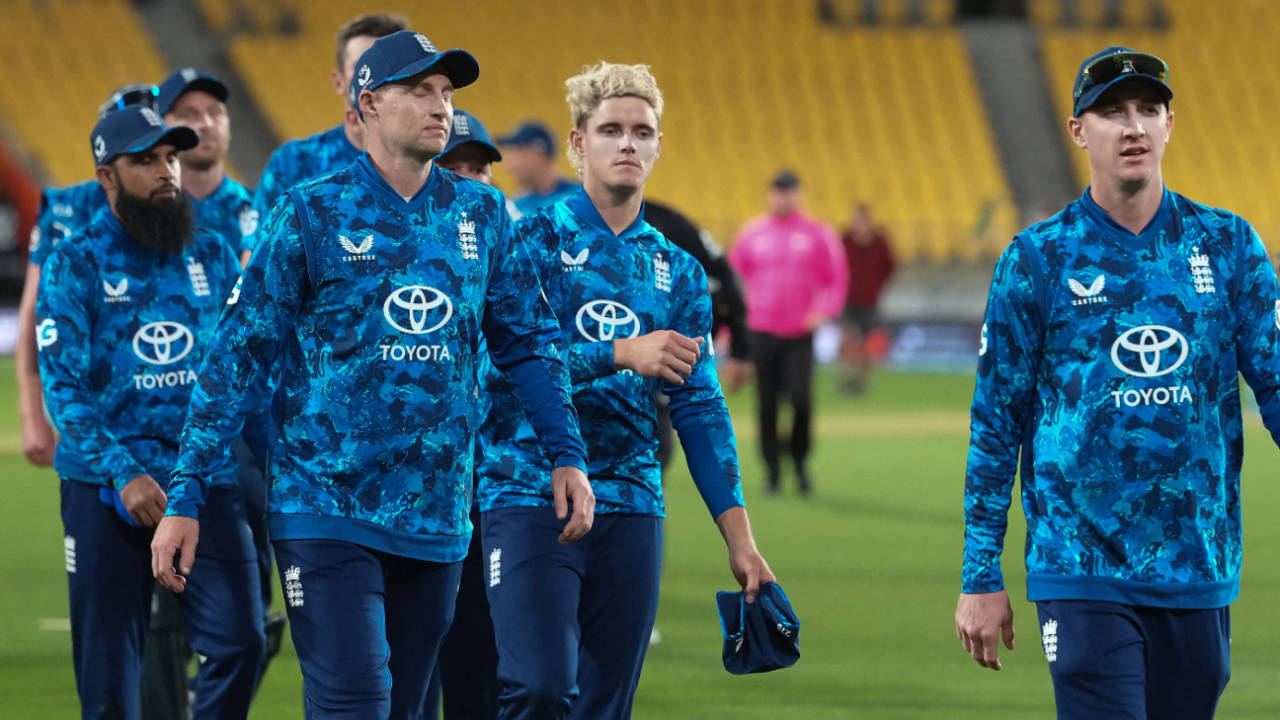So what was the point of this tour? Was it building up to the Ashes or not? The only storyline that was meant to be at play was Bethell. He had six Pope-free hits to make the case that it should be him whom the white smoke announced as England's chosen one. But since his ton
against South Africa in September, he has kept getting out. In his nine international innings since that innings at Southampton, he has averaged 15.
It is never beyond England to make a bold selection call, but Bethell isn't quite the unknown, untouched prodigy he was a year ago. Across formats, he has 42 international innings under his belt and an average in the mid-30s. If England wanted a 'my hands are tied' decision to go for Bethell rather than Pope, they haven't got it.
That should have been it, narrative-wise, for England as they left New Zealand. But such was their
historic batting combustion they created a new one. Across three matches, the top four made 84 runs across a combined 12 innings - the lowest combined tally in the history of ODI cricket.
Batting conditions across all three matches were difficult, and the Black Caps made the most of them, bowling beautifully. But the one true test England need to overcome if they are to have any chance in Australia is to combat high-quality seam bowling, on lively pitches. And in that regard, they failed dramatically. It is also worth noting that this was a New Zealand attack without six seamers through injury. New Zealand 'C', wiping the floor with England 'A'. It's not brilliant.
Brendon McCullum was bullish that those issues
do not translate across formats: "I think in Test cricket we've found ways in various conditions to deal with seaming wickets." But in the absence of high-intensity red-ball games in the lead-up to the Ashes, facing an international attack in a format that England say themselves they approach with the same kind of tempo that they use in Test cricket, this was arguably as good a preparation as they could have in the modern day.
England will continue to get heat for not scheduling more warm-up matches for the Ashes. But short of somehow turning this trip into a red-ball series (England arranged an
ad hoc Test tour of New Zealand in 2023, so it could have been possible), the options in the current day and age are limited. Play too much cricket and you burn out your bowlers. Or, play, and face opponents and wickets a mile away from what you are preparing for. When England played a
two-day match in Queenstown last year ahead of the New Zealand Tests, New Zealand's PM's XI had eight players with five or fewer first-class appearances to their name. The same was true when they last arranged external warm-up matches for an Ashes in 2017-18.
"We'll have no excuses come Australia," McCullum summarised simply.
The players and staff know what is around the corner. As soon as the first loss on the tour came, those in line for Ashes appearances were no longer put up for press, with assistant coaches Marcus Trescothick and Jeetan Patel wheeled out instead. Journalists only want to ask about Australia and the risk-reward for England wasn't in their favour. Similarly, players in general are reluctant to do any extra media that isn't required, so as not to stoke the fires of a war of words in which there are only losers.
England got an idea of what that extra spotlight will look like when they were filmed the night before the final ODI having a post-dinner drink. The leadership said from the offset that this tour was about fun and building a collegiate spirit in a white-ball group that rarely spends time together. There was no news story here, the headline would have read "Adult has beer after dinner", but that is only true until someone sticks a camera in your face with no timestamps or context. Then, all of a sudden, it's an Instagram caption that reads "England are on the piss". You could, of course, make the argument that - given there were 21 nights on this tour - maybe on one of the three where you have a game at 2pm the next day you stay in and don't let someone film you with a drink. But this group runs toward the danger.
"Go harder," Harry Brook says, shadow-batting with his pint glass.
England will consider themselves better off for the slap on the wrist. A young group is going into the furnace with a ready-made example of what to expect over the next two months.
Whether that is fair or not extends to the legacy of the coming series, where the facts are simple. If England win in Australia, this will be forgotten. But if they lose, it all started here. Is that fair? No. But is it the case? Yes.

